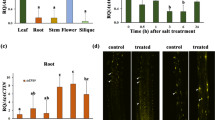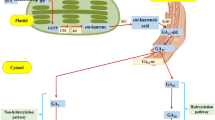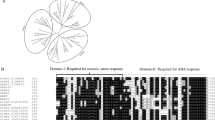Abstract
Expansins are cell wall loosening proteins that appear to permit the microfibril matrix network to slide in growing plant cell walls, thereby enabling the wall to expand. To scrutinize possible impacts on plant growth and development when expansins are over-expressed, we characterized phenotypic alterations of the transgenic plants that constitutively expressed AtEXP3 or AtEXP-β1 under control of 35S-CaMV promoter. Our results suggest that both AtEXP3-OX and AtXPβ1-OX are very sensitive to salt stress. However, the mechanisms underlying their enhanced salt sensitivity appear to be different.






Similar content being viewed by others
References
Brummell DA, Harpster MH, Civello PM et al (1999) Modification of expansin protein abundance in tomato fruit alters softening and cell wall polymer metabolism during ripening. Plant Cell 11:2203–2216
Cardona CA, Sanchez OJ (2007) Fuel ethanol production: process design trends and integration opportunities. Bioresour Technol 98:2415–2557
Catalá C, Rose JKC, Bennett AB (2000) Auxin-regulated genes encoding cell wall modifying proteins are expressed during early tomato fruit growth. Plant Physiol 122:527–534
Cosgrove DJ (1997) Relaxation in a high-stress environment: the molecular bases of extensible cell walls and cell enlargement. Plant Cell 9:1031–1041
Cosgrove DJ (2000) Loosening of plant cell walls by expansins. Nature 407:321–326
Hiwasa K, Rose JKC, Nakano R et al (2003) Differential expression of seven α-expansin genes during growth and ripening of pear fruit. Physiol Plant 117:564–572
Kende H, Bradford K, Brummell D et al (2004) Nomenclature for members of the expansin superfamily of genes and proteins. Plant Mol Biol 55:311–314
Lee H, Guo Y, Ohta M et al (2002) LOS2, a genetic locus required for cold-responsive gene transcription encodes a bifunctional enolase. EMBO J 21:2692–2702
Lee Y, Kende H (2001) Expression of β-expansins is correlated with internodal elongation in deepwater rice. Plant Physiol 127: 645–654
Li Y, Darley CP, Ongaro et al (2002) Plant expansins are a complex multigene family with an ancient evolutionary origin. Plant Physiol 128:854–864
McQueen-Mason S, Cosgrove DJ (1994) Disruption of hydrogen bonding between plant cell wall polymers by proteins that induce wall extension. Proc Natl Acad Sci USA 91:6574–6578
McQueen-Mason S, Cosgrove DJ (1995) Expansin mode of action on cell walls: analysis of wall hydrolysis, stress relaxation, and binding. Plant Physiol 107: 87–100
Putter J (1974) Peroxidases. In: Bergmeyer HU (ed) Methods of enzymatic analysis 2. Academic Press, New York, pp 685–690
Ragauskas AJ, Williams CK, Davison BH et al (2006) The path forward for biofuels and biomaterials. Science. 27:484–489
Reidy B, McQueen-Mason S, Nösberger J et al (2001) Differential expression of α- and β-expansin genes in the elongation leaf of Festuca pratensis. Plant Mol Biol 46:491–504
Rose JKC, Lee HH, Bennett AB (1997) Expression of a divergent expansin gene is fruit specific and ripening-regulated. Proc Natl Acad Sci USA 94:5955–5960
Sampedro J, Cosgrove DJ (2005) The expansin superfamily. Genome Biol 6: 242
Service RF (2007) Cellulosic ethanol. Biofuel researchers prepare to reap a new harvest. Science 16:1488–1491
Shin JH, Jeong DH, Park MC et al (2005) Characterization and transcriptional expression of the α-expansin gene family in rice. Mol Cells 20:210–218
Thordal-Christensen H, Zhang Z, Wei Y et al (1997) Subcellular localization of H2O2 in plants. H2O2 accumulation in papillae and hypersensitive response during the barley–powdery mildew interaction. Plant Journal 11:1187–1194
Vreeburg RA, Benschop JJ, Peeters AJ et al (2005) Ethylene regulates fast apoplastic acidification and expansin A transcription during submergence-induced petiole elongation in Rumex palustris. Plant J 43:597–610
Wu Y, Meeley RB, Cosgrove DJ (2001) Analysis and expression of the alpha-expansin and beta-expansin gene families in maize. Plant Physiol 126: 222–232
Acknowledgements
This work was supported by a grant from the Rural Development Administration (Biogreen21; to Hojoung Lee; grant #2007040103468302) and in part by a grant from KOSEF, SRC (to Hojoung Lee, 2007; grant #R11-2001-092-04004-0) in part by grant from Korea university (to Hojoung Lee, grant # K0715311).
Author information
Authors and Affiliations
Corresponding author
Rights and permissions
About this article
Cite this article
Kwon, Y., Lee, H., Kim, K.H. et al. Ectopic expression of Expansin3 or Expansinβ1 causes enhanced hormone and salt stress sensitivity in Arabidopsis. Biotechnol Lett 30, 1281–1288 (2008). https://doi.org/10.1007/s10529-008-9678-5
Received:
Revised:
Accepted:
Published:
Issue Date:
DOI: https://doi.org/10.1007/s10529-008-9678-5




